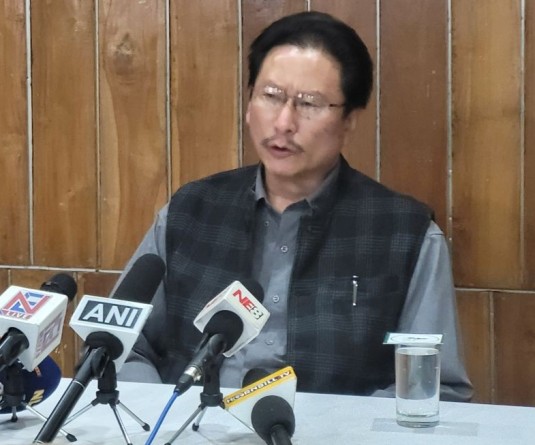
It is time to change our attitude
Morung Express News
Dimapur | February 17
In what could be termed unusual, especially when Nagaland is high on election, children from varied background, who had been victims of child abuse in the past called for a press conference today. The hall at Assisi Higher Secondary School packed with children of different age groups was filled with mixed emotions as children shared their stories of misery.
Hope (name changed) could not hold back her tears as she narrates the story of her torturous life. “They (owner) used to beat me. They used to kick me out of bed in the morning. They would feed me stale food, and when I won’t eat they would beat me. They did not let me go to school. ” Hope was sold as domestic worker in Nagaland by her drunk father when she was 4-year-old.
All six children who stood on the podium seemed happy, but it was obvious that their past was a reminder of a dark past, for they all became teary as they shared their stories.
As the banner on the stage read “A day of hope: Creating a space for children,” the programme was jointly organized by Nagaland Domestic Workers Movement and Assisi Centre for Integrated Development to offer a forum for children to express themselves. It is a day of hope, “especially for those who do not have enough hope at all levels,” said Sister Therese, Director, Assisi Centre for Integrated Development.
In Nagaland, child labour and abuse is on the rise, even though the issue is inefficiently highlighted in the media, or otherwise. Lack of awareness and understanding of it as a non-issue among Nagas has become an issue in itself. “In almost every household in Nagaland, there are children abused every day, but children don’t report, neighbours don’t report,” says Lazua Kape, who works with child helpline at Prodigals Home, a Short Stay Home for Women (SSH) in Dimapur.
Most of the children in domestic labour are immigrants trafficked to Nagaland from its bordering state, Assam with a promise of better education and livelihood. But, most of them are kept as domestic help with no access to education, or basic needs, like food.
“The parents come once in a while to check after us. They do not know our daily ordeal,” laments one of the girls on stage. “Parents should not give away their children to others for want of money.”
Even after Indian government’s decision to make elementary education mandatory, whereby Right to Education Act (RTE) was enacted, there are many domestic child workers in Nagaland who do not attend schools. Right to education which came into force on April 1, 2010, promises free and compulsory education to children between the ages of 6 – 14.The Act also requires all private schools to reserve 25% of seats to children from poor families (to be reimbursed by the state as part of the public-private partnership plan).
“As Christian, we accommodate children out of kindness. In reality, they are children in domestic labour.” Sister Therese points out. “Work culture is very less among Nagas. We easily want somebody to work for us.”
Everybody says and knows children are the future, but very little is done to address their issues. As long as their rights are not given or educated to them. For as long as the lives of the children are doomed, so is our future.
The children at the press conference’s lives are better, since their escape from the clutches of domestic labour, but there are still many innocent children out there waiting to be rescued. “They loved their pets more than me. I was treated worse than animals.”






